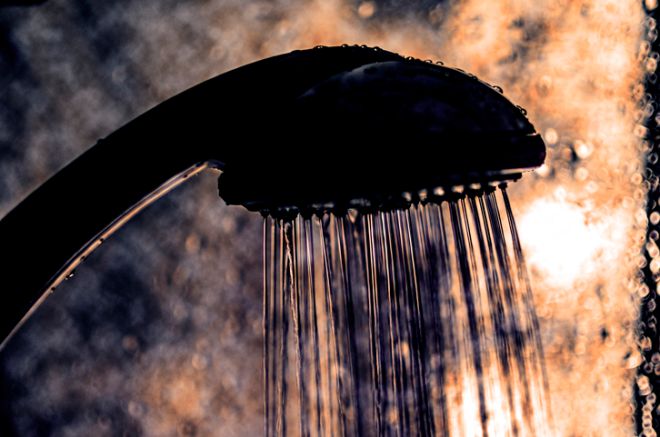Should You Shower At Night Or In The Morning?
This One Shower Trick Could Boost Your Sleep And Beat B.O.—According To Experts - Page 2
Share the post
Share this link via
Or copy link

Do you love taking a hot shower at night or starting your morning off with a good rinse? Well, experts say that there’s an optimal time that you should jump into the shower to get yourself squeaky clean. According to Shahab Haghayegh, an instructor at Harvard Medical School and Massachusetts General Hospital, showering at night is beneficial for sleep and regulating our body temperature for the best rest.
“When we take a nighttime shower at the right time and temperature, it helps us fall asleep,” Haghayegh explained to Time.
RELATED CONTENT: Random Rumor Claims Kanye West’s Wife Bianca Censori Is ‘Turned Off’ By His B.O.
Related Stories
-

9 Plus-Size Lingerie Pieces That’ll Make You Want To Keep Your Clothes Off On Valentine’s Day (Even If It’s Just for You) - Page 2
-

Paris Couture Street Style Is Gagging Us— 7 Lewks That Rival The Runway - Page 2
-

‘NEED’ — Fans Sound Off On Teyana Taylor’s ‘Concrete Rose’ Air Jordan Collaboration - Page 2
The health researcher conducted a study in 2019 that found that water-based passive body heating (PBHWB) through warm showers or baths could significantly improve various aspects of sleep quality. Specifically, bathing in water at temperatures between 40 and 42.5°C (104–108.5°F), especially when done 1 to 2 hours before bedtime for as little as 10 minutes, was associated with improved self-rated sleep quality, better sleep efficiency, and a noticeable reduction in the time it takes to fall asleep (sleep onset latency). These benefits are believed to result from a drop in core body temperature following PBHWB, facilitated by increased blood flow to the hands and feet, which enhances the body’s ability to slow down its internal heating system, helping you to fall asleep faster and longer at night.

Love MadameNoire? Get more! Join the MadameNoire Newsletter
We care about your data. See our privacy policy.
If you’re a morning time rinser hoping to switch up your shower time to the evening for optimal sleep, it may take some time for your circadian rhythm to adjust, explained Haghayegh. A circadian rhythm is the body’s natural, roughly 24-hour cycle that regulates various physical, mental, and behavioral processes, the Cleveland Clinic notes. It influences your sleep-wake cycle and affects your hormones and digestion.
“The body clock doesn’t change that easily,” Haghayegh told Time, explaining that he had to gradually shift his bedtime by 30 minutes each night while incorporating more nighttime showers to help regulate his sleep.
Showering at night can be beneficial for personal hygiene.

Outside of rest, showering at night can also be a game changer for your hygiene, says Dr. Primrose Freestone, a senior lecturer in clinical microbiology at the UK’s University of Leicester. In an article for The Conversation, published May 19, Freestone explained that nighttime showers are beneficial for ridding the body of pollutants, allergens, sweat, and oil that collect on our skin and hair throughout the day. If we take a shower in the morning, many of those pesky germs linger on us, feeding and breeding bacteria on our skin throughout the day, which can lead to disruption of the body’s natural microbiome, causing body odor.
“Although many of us think that body odor is caused by sweat, it’s actually produced by bacteria that live on the surface of our skin,” Freestone penned. “Fresh sweat is, in fact, odorless. But skin-dwelling bacteria—specifically staphylococci—use sweat as a direct nutrient source. When they break down the sweat, it releases a sulphur-containing compound called thioalcohols, which is behind that pungent BO stench many of us are familiar with.”
Freestone warned that taking a shower at night won’t do much good if your bedsheets aren’t washed regularly. Dirty sheets can transfer odor-causing germs onto your freshly cleaned skin while you sleep. Also, even after showering, your body still sheds skin cells during the night. These skin cells can become food for dust mites, which leave behind waste that can trigger allergies. So, if you want to stay clean and avoid potential allergy problems, it’s important to wash your bedsheets often, too.
Interestingly, showering habits vary across age and sex groups in the U.S. According to a 2022 study conducted by the Sleep Foundation, women are slightly more likely to shower or bathe at night (27.9%) than in the morning (25.5%), while men show a stronger preference for morning showers, with 40.8% choosing to clean up after waking compared to just 21.7% at night. Age also plays a role: those under 34 are more inclined to bathe before bed (31.3%) than in the morning (27%), with nearly half (46.2%) saying it helps them fall asleep. In contrast, adults over 34 favor morning showers (35.9%) over evening ones (21%), with the majority (57.5%) citing the desire to feel more awake as their main reason.
When do you prefer to take a shower? Tell us in the comments section.
RELATED CONTENT: The Booty Is Sitting, But Something’s Stinking: Let’s Talk ‘BBL Smell’
-

She Tried It: Inahsi Naturals Aloe Hibiscus Leave-In Conditioner & Detangler
-

Meet Dominique Fils-Aimé, The Haitian-Canadian Star Redefining Jazz For A New Generation: ‘This is My Vision' [Exclusive]
-

Cooking With Purpose — How Brittney Williams Honors Her Caribbean Roots Through Food
-

8 Famous Lesbian Women Who Were Married To Men



